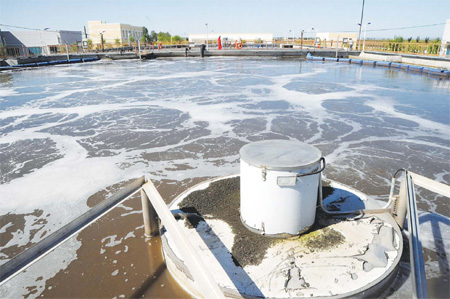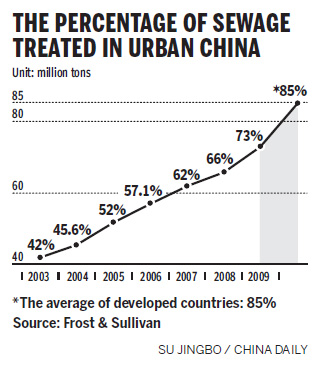Tapping into the future
Updated: 2011-05-27 11:12
By Lu Chang and Yao Jing (China Daily European Weekly)
 Sewage is treated in a plant in Wudalianchi, Northeast China's Heilongjiang province. Qiu Qilong / for China Daily |
Foreign companies are investing in China's water industry as many predict a growing profit margin
When Wang Liu first came to Beijing for college nine years ago, she thought she could drink the tap water. After all, it is the Chinese capital. Wang is a native of Fushun, a city of Liaoning province in Northeast China where people have to boil the tap water before drinking it. But like tens of millions of residents in Beijing, Wang soon discovered the tap water was not safe to drink and a possible health threat.
"The water from my tap has a very noticeable odor, and it seems to have lots of chemicals in it," says the 28-year-old, who works at an investment bank. "I called the water company several times to file a complaint, but the problem never got solved.
"So when I found a convenient place to buy bottled water, I never looked back, even if it's a lot more expensive than tap water."
To address the water issues in the country, China has declared sustainable use of water resources and safe drinking water to be major policy goals. This has opened the doors to foreign companies eager to grab a piece of the fast-growing water market.
In China, it is mainly State-owned companies that run the water industry with government funding as the major source of investment.
Analysts say that many State-owned water companies lack the incentives to improve technology, because government favoritism has left little competition among the companies.
Jin Yongxiang is the general manager of Dayue Consulting Co Ltd and specializes in public-sector consultancy. He has worked for many international water companies with projects in China and says many State-owned water enterprises remain encumbered by legacy assets. This includes obsolete water treatment equipment and technology, as well as broad social obligations such as healthcare and pensions.

He says another hindrance is the job situation at State-owned companies. They are regarded as "iron rice bowl"; once employees are recruited, it is almost impossible for them to be fired.
"Besides, most of the managers in State-owned companies are former government officials with little experience in the water industry," Jin says. "This makes the water companies very inefficient in providing water services and improving transparency."
According to a recent report by the World Bank, one-fourth of water enterprises in China are unable to provide sufficient water pressure and some companies have very serious problems of water leakage in pipelines.
Chen Lei, the minister of water resources, attended a roundtable meeting last month in Beijing on the effects of climate change on water resources.
He says about two-thirds of 600 cities in China have trouble accessing water.
China is now one of Asia's most promising investment destinations for water treatment and distribution, drawing major players such as Veolia Water, Suez Environnement and Thames Water.
Local rivals, such as China Water Industry Group, China Railway and Guangdong Investment, are also interested.
"Foreign investment and private sector participation in China's water industry began in the early 1990s, but the opportunities are great," Jin says.
"As a result, many international players that have water exposure in Asia are focused on the Chinese market."
The central government has earmarked 4 trillion yuan (414 billion euros) to be spent over the next 10 years on water projects.
Foreign firms are upbeat that this will translate into great growth prospects and are keen to get a foothold.
Data from Frost & Sullivan, a global business market research and consulting firm, show that in 2010 there were 1,741 tap water companies in China. The value of the urban water supply totaled 68.34 billion yuan in 2008, an increase of 8.5 percent year-on-year.
Foreign firms invested 11 billion yuan in China's water sector from 2004 to 2009, spending 3.2 billion yuan in 2009 alone.
The projects include waste water treatment, municipal water supply, industrial water supply and direct investment in Chinese water companies.
E-paper

Pearl paradise
Dreams of a 'crazy' man turned out to be a real pearler for city
Literary beacon
Venice of china
Up to the mark
Specials

Power of profit
Western companies can learn from management practices of firms in emerging economies

Foreign-friendly skies
About a year ago, 48-year-old Roy Weinberg gave up his job with US Airways, moved to Shanghai and became a captain for China's Spring Airlines.

Plows, tough guys and real men
在这个时代,怎样才"够男人"? On the character "Man"
